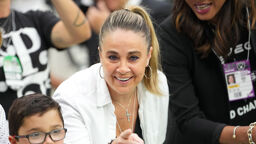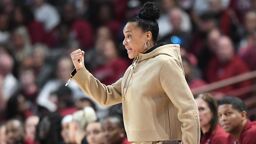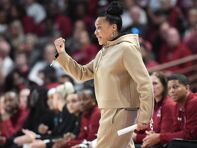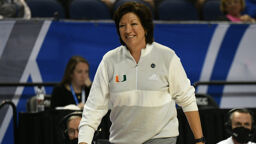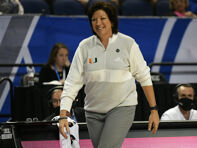On Feb. 2 in Miami, San Francisco 49ers offensive assistant Katie Sowers will be the first female coach and first openly gay coach in Super Bowl history, a history that spans 53 years. It’s a big deal. Or is it?
Who cares if she’s gay? Why is that even an issue? If she’s good she’s good … be it a woman man gay straight whatever. The hypocrisy of not wanting to be separated due to sexuality but then demanding to be labeled by it is mind-blowing.
The above comment was typical of a not-insignificant number of people responding to our story heralding Sowers as a double first as a woman and an out LGBTQ NFL coach. The “who cares?” response might seem reasonable on its face, since in an ideal world we wouldn’t care. But we don’t live in an ideal world. The simple fact that Sowers is both the first woman and first openly gay coach in the history of the nation’s biggest sporting event is obviously newsworthy.
In the 1987 season, Washington’s Doug Williams became the first black quarterback to start in the Super Bowl when he led a 42-10 rout of the Denver Broncos. Williams’ race was a major story that year, and Michael Wilbon of the Washington Post chronicled the numerous questions Williams was asked during Super Bowl week:
“Doug, do you feel like Jackie Robinson?”
“Doug, would you have been able to handle all of this, especially the black thing, if you had made the Super Bowl a few years back, say, when you were 25?”
“Doug, has there been much progress in this country since 1970, when the schools you grew up in were finally integrated?”
“Doug, do you feel because of the black quarterback issue, that the whole country is looking at you and saying, ‘Well, what are you going to do?’”
“Doug, would it be easier if you were the second black quarterback to play in the Super Bowl?”
“Doug, why haven’t you used being the first black quarterback as a personal forum for yourself?”
Now, 32 years later, Patrick Mahomes will be the seventh different black quarterback to start in a Super Bowl, and the 10th to start a game in the 2019 NFL season. A quarterback’s ethnicity is seldom a major topic or conversation, though it still is important to show young black football players there are no positions off-limits. But unlike Williams, I would be surprised if many asked Mahomes about being a black quarterback.
But many people — especially women and LGBTQ people — do care about Sowers’ background. She is a trailblazer and gives people who might otherwise have felt excluded from a career in pro football something to strive for. Enough people cared about the Sowers’ story that our original tweet got more than 1,100 retweets and 4,300 likes, 737,000 Twitter impressions and dozens of supportive comments. Here are two that best sum up her importance:
Being the first to break a previously unbreakable paradigm is a big deal. That’s why. Being a groundbreaker means you fought the good fight and won. America celebrates winners. Be an American. Celebrate the win. @dansattazahn
I can’t think of any examples of barriers that were brought down without advocacy and attention. Not caring tends to support the status quo. … Lots of women and gay people have been kept out of positions in sports despite their merits, so it’s cool to see her as a representative that those attitudes are changing. It’s worth recognizing the milestone. @DTakedowns
At Super Bowl media night on Monday, Sowers was one of the most sought-after interviews, and even 49ers general manager John Lynch weighed in, saying: “I’ve got three daughters. And I think it’s really cool for girls to realize they can dream to do this as well.”
Who else cares that Sowers is an out, proud gay woman? Goshen College in Indiana, where Sowers went as an undergrad, playing three sports.
A decade ago, after graduating, Sowers volunteered as a coach for the school’s basketball team but was rejected by head coach who said her being gay would bother parents. “I thought it would be natural to ask if I could be a volunteer assistant coach, and my coach called me in and said they have a lot of parents that have been worried about their daughter being around someone who is gay, and he said we got rid of all of that,” Sowers said in an interview with NBC Sports Bay Area. “That’s not something they would want around the team. So, he asked that I would not be around the team anymore.”
This week, school president Rebecca Stoltzfus apologized to Sowers:
We are very proud of all that our alumna Katie Sowers ‘09, an assistant coach for the Super Bowl-bound San Francisco 49ers, has achieved in her life and the ways that she leads on and off the football field with authenticity, grace and excellence. She has publicly shared her journey to coaching, including the barriers she faced related to her sexual orientation when seeking a volunteer coaching position at Goshen College. Sadly, in 2009, our policies and the laws of Indiana allowed for hiring decisions to consider sexual orientation. I am glad that Goshen College adopted a new non-discrimination policy in 2015, and I am thankful for the leaders before me who brought this change about, not the least of whom were our students and alumni.
Our new vision states: “Being rooted in the way of Jesus, we will seek inclusive community and transformative justice in all that we do.” While we cannot go back and change history, justice calls us to stand up now and say that the way Goshen College treated Katie’s offer to coach was hurtful and wrong. I express on behalf of the institution our profound apologies to Katie Sowers and to all others who have not been welcomed here, simply because of who they are. And I want to personally thank all of our students, employees and alumni who call us to be and do better.
Stoltzfus does not issue that apology if Sowers had stayed silent, never came out and never discussed discrimination she felt because of her orientation. That’s the power of her story and why people should care. It’s only through visibility, sharing our stories and striving toward inclusion that change is possible.
Sowers’ historic feat inspired the famous (Billie Jean King and Alyssa Milano, among others) and moms and dads and their daughters who saw Sowers as a role model (Dawn Ennis has a great roundup). Brian was a perfect example, tweeting: “Tonight, my 12 year old daughter and I saw the commercial featuring @KatieSowers. For months, Hailey has struggled with her identity. After that commercial, she turned to me and said, ‘Daddy, I’ll be okay. Now I know I can do anything.’ ”
Let’s hope that at some point in the near future that there are so many women and out LGBTQ coaches in the NFL that stories about that aspect of them become routine, and we all can stop caring for the right reasons.



